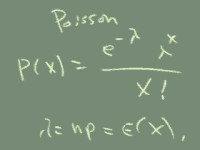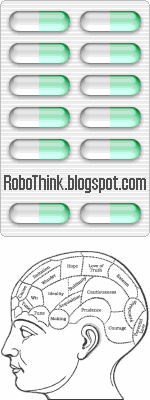Empathy Deficit
 Are bio-medical scientists and experimental psychologists temperamentally well suited to the task of understanding human emotions and feelings?
Are bio-medical scientists and experimental psychologists temperamentally well suited to the task of understanding human emotions and feelings?Simon Baron-Cohen is Professor of Developmental Psychopathology at the University of Cambridge. He is also co-director of the Autism Research Centre at Cambridge. Autistic individuals have a deficit in their capacity to perceive the feelings which other people experience in social situations. They also have difficulty recognizing that circumstances and events can be interpreted in a variety of ways by different individuals. Simon Baron-Cohen refers to this type of deficit as Mindblindness (the title of one of his books).
There are milder forms of autism in which cognitive functions are not impaired, and some individuals can have exceptional mathematical, musical or artistic abilities. Simon Baron-Cohen believes there are innate differences between male and female brains. In his view, female brains are predominantly wired for empathy, whereas male brains are predominantly wired for understanding and building systems. He describes autism as an extreme version of the male brain, which may explain why autism is more common among males.
The range of impairments, from mild to extreme, is referred to as the "Autism Spectrum," and encompasses cases of Asperger's Syndrome. Components of these various disorders include poor social skill, poor communication skill, poor imagination, exceptional attention to detail, poor attention-switching and a narrow focus of attention. Not all of them are necessarily present in each individual case.
A self-test is available as a PDF document on the Autism Research Centre's website. One particular study was designed to develop a brief, self-administered test for measuring the degree to which an adult with normal intelligence has traits associated with the autism spectrum. The report has the long-winded title "The Autism-Spectrum Quotient: Evidence from Asperger Syndrome/High Functioning Autism, Males and Females, Scientists and Mathematicians." If you read the research report it might help to keep in mind these acronyms:
AQ - Autism-spectrum Quotient.
AS - Asperger Syndrome.
HFA - High-Functioning Autism.
The research study assessed four groups of subjects:
Group 1: 58 adults with Asperger Syndrome.
Group 2: 174 randomly selected controls.
Group 3: 840 students in Cambridge University.
Group 4: 16 winners of the UK Mathematics Olympiad.
The report states:
"Among the group of 840 students, scientists scored significantly higher in autism spectrum traits than humanities and social sciences students, confirming an earlier study which showed that autistic traits are associated with scientific skills."Within the subgroup of science students, mathematicians, engineers, physical, and computer scientists were found to have the highest scores, followed by biologists, experimental psychologists and medical students.
These findings raise the question: "Are bio-medical scientists and experimental psychologists temperamentally well suited to the task of understanding human emotions and feelings?" (see Scientific brain linked to autism - BBC article). They have no difficulty inventing new ways to categorize and label symptoms, but have they made major breakthroughs in curing emotional ill-health? For those conditions for which antidepressants are typically prescribed the answer is "No." Likewise for schizophrenia. They haven't got to that stage yet. They're still gathering statistics.
It's important to point out that there's no reason to believe Asperger Spectrum traits would be a handicap in any other field of science or technology. During World War II, British cryptographers at Bletchley Park succeeded in deciphering coded German communications, a crucial factor in the allied victory. Without computer scientists and electronics engineers there would be no internet. And maybe one day astrophysicists will save the human race from extinction by working out how to deflect an asteroid from a collision course with our planet. With the notable exception of psychiatry, medical practioners in other fields have progressively improved treatment outcomes as each decade goes by. Medical research has delivered spectacularly beneficial advances like artificial heart valves, synthetic skin for burn victims, and new stem cell treatments.
By contrast, bio-psychiatrists assert the existence of hypothetical 'chemical imbalances' and 'genetic predispositions' for which they have no incontrovertible evidence. By and large they ignore family and societal factors. They are content to administer drugs of dubious worth to adults & children regardless of the aetiology of their symptoms. Part of the problem is that, in medical school, they are mainly taught about anatomy, physiology, biochemistry and genetics. So they try to shoehorn explanations for all types of psychological distress into those categories. Instead of a last resort, their first resort is to mask the symptoms of distress by drugging people.
A similar problem occurs in the field of psychology. An ambitious psychology student can achieve outstanding academic success despite exhibiting a degree of empathy deficit slightly below the threshold for a formal clinical diagnosis of "high functioning autism." It should come as no surprise that such individuals tend to favour cognitive therapy and mechanistic genetic hypotheses, because their cognitive faculties aren't impaired. There's no shortage of computer geeks in university psychology departments. The point is that certain personality types - including those who are typically attracted to studying medicine or experimental psychology - are probably not best suited to working with people who fall into the category of "mental health consumers."
The film "Blade Runner" is about a bounty hunter who's task is to track down and "retire" fugitive androids who are trying to pass themselves off as human beings. It's based on Philip K.Dick's novel, "Do Androids Dream of Electric Sheep?" In the real world, do psychiatrists and cognitive scientists dream of a future in which emotions and feelings are controlled and managed with drugs and social engineering? Can psychological well-being flourish in materialistic cultures that undermine the stability of mutually supportive community networks?

2 Comments:
You might be interested in checking out S Gallagher who disputes the Mindblindness theories, replacing Mind Theory with Interaction Theory.
I continue to be sceptical about the theories of Ali G's cousin, Baron-Cohen. I wonder how AS can simply be an extreme of the male brain when women can be AS and men can be more empathetic than women.
"...confirming an earlier study which showed that autistic traits are associated with scientific skills" Hmm - the research omitted to demonstrate that autistic traits are also associated with artistic and creative ability. The conclusions seem pretty partial and flawed. Would you agree? :-)
Thanks for the tip about Gallagher's Interaction Theory. I, too, am somewhat sceptical about the theories of Ali G's cousin, Simon Baron-Cohen. I included an outline of his views because he is a high profile researcher. In the May 03, 2003, issue of New Scientist magazine there was an article titled "Did Einstein and Newton have autism?", in which Baron-Cohen suggested they both suffered from autism. The story was reported in many newspapers at the time. I don't know much about Isaac Newton, but from biographies of Einstein I get the impression he was a deeply compassionate man. I don't think it's fair to place labels on people who are no longer around.
I mentioned that some individuals can have exceptional mathematical, musical or artistic abilities.
<< Home